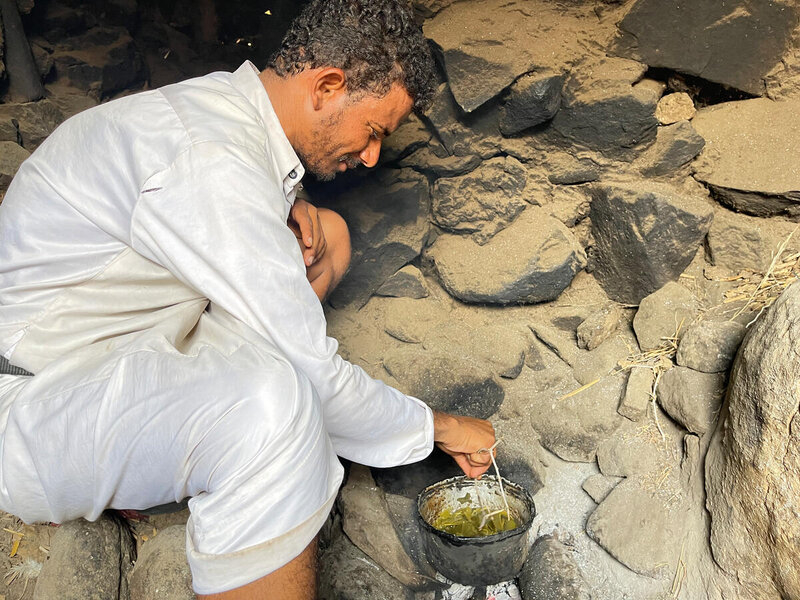Halaṣ
- Leaves from the halas plant (a wild edible plant in Yemen)
- Water
- Traditional buttermilk (ḥaqin) (if available)
PREPARATION
- Gathering the leaves: Collect the leaves from the halas plant.
- Cooking: Boil the leaves in a large amount of water until the bitter taste is removed. This may take some time, so taste periodically to ensure the bitterness has faded.
- Adding buttermilk: Once the leaves are ready and no longer bitter, drain the water. If you have access to ḥaqin, gently stir it into the cooked leaves until you achieve a smooth consistency.
- Serving: Serve warm without any additional spices. This dish was a survival food, especially during periods of drought and famine when more nutritious ingredients were unavailable.
When analyzing modern food crises caused by human actions, the food crisis in Yemen stands out as the most scandalous. It is a humanitarian disaster rooted deeply in political conflict, armed actions, and deliberate blockades of food and humanitarian aid deliveries.
The armed conflict in Yemen began in 2015, and since then, the war has led to the systematic destruction of civilian infrastructure, including farmland, ports, transport routes, and food warehouses. Naval and air blockades, particularly those imposed by the Saudi-led coalition, have prevented the import of food and medicine. These intentional actions have turned starvation into a weapon of war.
In Yemen, food and humanitarian aid are often used as tools in the conflict. Supply blockades and obstacles faced by humanitarian organizations have cut many communities off from basic life necessities. This deliberate tactic is aimed at pressuring the war’s opponents at the expense of millions of innocent people.
Yemen is recognized by the UN as the worst humanitarian crisis in the world. Over 16 million people suffer from a lack of access to adequate food. The country experiences extreme malnutrition, particularly among children, with hundreds of thousands at risk of dying from hunger.
One of the most shocking aspects of this crisis is that Yemen is located on the Arabian Peninsula, a region rich in oil resources, home to some of the wealthiest countries in the world. Despite this, Yemen is mired in poverty, and its population suffers from the conflict, which has economic benefits for the key players involved.
The Yemeni crisis is an example of the deliberate and calculated use of starvation as a political weapon in a modern conflict. While technology and global logistics could easily alleviate the crisis, intentional blocking of aid and destructive actions are causing people to die from hunger, representing a blatant violation of human rights. This crisis highlights how destructive war can be when basic humanitarian principles are ignored.

